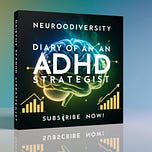When Your Path to Parenthood Isn't Typical
"The nurse handed me a stack of paperwork with tiny print that seemed to swim before my eyes. As other expectant parents in the waiting room quietly filled out their forms, I sat frozen, my ADHD brain overwhelmed by the task.
My partner gently took the clipboard and whispered, 'Let's do this together.' It was the first of many moments when I realized my neurodivergent experience of pregnancy would be different—not less, just different."
For parents who are neurodivergent—whether you have ADHD, autism, dyslexia, or other neurological differences—the journey through pregnancy, birth, and early parenthood can feel like navigating uncharted territory. 🧭
While mainstream parenting resources often assume neurotypical experiences, your unique brain wiring brings both challenges and surprising strengths to the parenting journey.
can feel like navigating uncharted territory. 🧭
What Is Neurodiversity, Anyway? 🧠
Neurodiversity simply means that human brains naturally vary in how they work, similar to biodiversity in nature. Some people's brains process information, emotions, and sensory input differently than what society considers "typical." This isn't a deficit—it's just difference.
Think of it this way: if brains were operating systems, neurotypical folks might run Windows, while neurodivergent people might run Linux or macOS. Different systems, same capability to get things done—just through different processes.
Why Understanding This Matters for Your Parenting Journey ❤️
Recognizing neurodiversity in your parenthood journey matters because:
It explains why certain aspects of pregnancy and parenting might feel more challenging for you than for others
It helps you advocate for accommodations during prenatal care, labor, and postpartum support
It allows you to tap into unique strengths your neurotype brings to parenting
It helps you prepare for the possibility of having a neurodivergent child (as many neurological differences have genetic components)
As Emma, a mother with autism, shared: "Once I stopped trying to parent like the neurotypical moms in my Facebook groups and embraced my autistic approach to motherhood, everything got easier. I created systems that worked for my brain, not against it."
S3 EP8: Seizures and Speech | A Mother's Love and a Therapist's Insight with Jeaneen Tang
Join us for a powerful and moving conversation with Jeaneen Tang, a speech language pathologist and mother navigating the unique challenges of raising a child with disabilities. In this episode, Jeaneen shares her personal journey and professional expertise, offering a glimpse into the world of childhood communication disorders, particularly in the cont…
The Science: How Neurodivergent Brains Experience Parenthood Differently 🔬
Research on neurodivergent parenting experiences is growing. Studies suggest:
Sensory processing differences can make certain aspects of pregnancy and childbirth more intense for neurodivergent parents
Executive functioning challenges may require different approaches to managing the multitasking demands of parenthood
Neurodivergent parents often develop innovative problem-solving approaches that benefit their children
The hormonal changes of pregnancy and postpartum can sometimes temporarily increase or decrease neurodivergent traits
Dr. Sarah Williams, neuropsychologist and author, explains: "The neurodivergent brain may process the physical and emotional experiences of pregnancy and new parenthood differently. This isn't better or worse—just different—and understanding these differences can help parents prepare and thrive."
Making It Work: A Neurodivergent-Friendly Approach to Pregnancy and Early Parenthood 💪
Pregnancy and Prenatal Care
✅ Step 1: Build Your Support Team – Find healthcare providers who understand neurodiversity or are willing to learn. Interview potential providers and ask direct questions about their experience with neurodivergent patients.
✅ Step 2: Create Sensory Survival Kits – Prepare for sensory challenges by creating kits for different settings (medical appointments, hospital stays, etc.) with items like noise-canceling headphones, fidget tools, or comfort objects.
✅ Step 3: Develop Information Management Systems – Use tools that work for your brain to track appointments, questions for providers, and pregnancy information. This might be a specialized app, a visual calendar, or voice notes—whatever helps your brain process information best.
Labor and Delivery
✅ Step 1: Design a Neurodivergent-Friendly Birth Plan – Include specific accommodations for sensory needs, communication preferences, and processing time. Consider including a disclosure about your neurotype if you feel comfortable.
✅ Step 2: Prepare Sensory Considerations – Request a quieter room if possible, bring familiar comforts, and consider how lighting and other environmental factors might affect you during labor.
✅ Step 3: Designate an Advocate – Ensure your partner or support person understands how to advocate for your needs if you become overwhelmed or unable to communicate effectively.
Early Parenthood
✅ Step 1: Embrace Visual Systems – Create visual reminders and routines for baby care tasks. Many neurodivergent parents thrive with visual schedules and checklists.
✅ Step 2: Build in Recovery Time – Plan specific sensory breaks or downtime, especially if you experience sensory overload. Even 5-10 minutes can help reset an overwhelmed nervous system.
✅ Step 3: Focus on Connection, Not Perfection – Find your unique ways to bond with your baby that work for your neurotype. This might look different than neurotypical parent-child interactions, and that's perfectly okay.
Real-Life Success: Neurodivergent Parenting in Action 🌟
Alex's Story: ADHD and Pregnancy "My obstetrician worked with me to schedule shorter, more frequent appointments after I explained how difficult it was for me to sit still through long appointments. I'd bring fidget toys and we'd often walk and talk instead of sitting in the exam room for discussions. These simple accommodations made prenatal care so much more accessible for my ADHD brain."
Jamie's Story: Autism and Early Parenthood "I created a detailed sensory map of our home, identifying quiet zones where I could retreat when feeling overwhelmed. My partner and I established clear communication signals for when I needed a sensory break. These systems meant I could be more present and regulated with our baby because I wasn't constantly in sensory overload."
S1 EP18: The Untold Truth About Balancing Motherhood, Autism and Career with Mandy Rees
🚀 Podcast : Balancing Motherhood, Autism and Career. 🚀
Pro Tips from Neurodivergent Parents 💡
Script Medical Conversations: Prepare and practice important conversations with healthcare providers ahead of time to reduce communication anxiety
Leverage Hyperfocus: Channel periods of hyperfocus into researching specific parenting topics or preparing nursery systems
Create External Memory Systems: Use apps, visual cues, and physical reminders instead of trying to remember everything internally
Batch Similar Tasks: Group similar baby care tasks together to reduce the mental load of task-switching
Advocate Through Education: Share brief, informative resources about your neurotype with providers to improve your care
Your Neurodivergent Parenting Cheat Sheet 📝
🔹 Trust Your Intuition: Your different way of thinking often leads to creative solutions others might miss
🔹 Accommodate, Don't Mask: Design your parenting journey around your authentic needs rather than trying to parent "typically"
🔹 Find Your Community: Connect with other neurodivergent parents who understand your unique challenges and victories
🔹 Prioritize Regulation: You'll be a better parent when your sensory and emotional needs are met—that's not selfish, it's necessary
🔹 Document Everything: Your memory processing might work differently, so use external systems to track important information
Further Reading to Support Your Journey 📚
📖 "Differently Wired: Raising an Exceptional Child in a Conventional World" by Deborah Reber – Amazon Link
📖 "Sincerely, Your Autistic Child" edited by Emily Paige Ballou, Sharon daVanport, and Morénike Giwa Onaiwu – Amazon Link
📖 "The Dyslexic Advantage" by Brock L. Eide and Fernette F. Eide – Amazon Link
📖 "A Radical Guide for Women with ADHD" by Sari Solden and Michelle Frank – Amazon Link
Helpful Tools for Neurodivergent Parents 🛠️
Visual Schedule Systems – Reusable visual routine charts for baby care tasks
Noise-Reducing Earplugs – Specifically designed to reduce overwhelming sounds while still allowing you to hear your baby
Baby Monitoring Apps with Visual Indicators – Apps that use visual cues rather than just sounds
Weighted Blankets – For regulation during the often dysregulating postpartum period
Remember, your neurodivergent brain brings unique perspectives and abilities to parenthood. By understanding and working with your neurotype—not against it—you can create a parenting journey that feels authentic, manageable, and joyful. Your different way of experiencing the world will give your child a rich and unique perspective that is a beautiful gift. 🌈
🎧 For more insights, check out this ADHD podcast:
If this article resonated with you, then help a friend and share it!
Also subscribe to never miss an ADHD hack to navigate your issues.


















Share this post